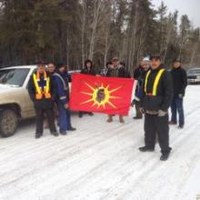The Daily GRRR! - November 27th, 2014
Welcome, I am your host Dan Kellar and you are listening to The Daily GRRR! on 100.3fm, CKMS in Waterloo, Ontario. Soundfm.ca on the web, today is Thursday November 27th, 2014.
We are broadcasting from the centre of the Haldimand Tract, the occupied Grand River Territory of the Haudenosaunee (Six Nations).
The Daily GRRR! is a project of the Grand River Media Collective; and is supported by the Community Radio Fund of Canada and CKMS.
Today’s feature is an interview from Micah Langer of CKUT with Lily Schwartzbaum , who has been working on pipeline resistance in Ontario and Quebec. Lily discusses opposition to the Line 9 and Energy east pipelines including the Peoples March For Mother Earth, the Campe Ligne 9 activity, and the Climate Montreal Communiqué.
Now we will start with today’s headlines:
The Daily GRRR!
HEADLINES for November 27th, 2014
1. Dene Trappers Blockade Road Access for Resource Exploration
2. Proposed Giant Gravel Pit Has Residents Gushing Over Source Water Protection
3. Some Neonicotinoid Restrictions Finally Coming to Ontario
4. Indigenous Deer Hunt Protests Condemned
5. Food Programs For Northern Indigenous Populations In Disarray
6. Dozens of First Nations May Lose Federal Funding
7. Racist Sexual Violence Opposed In Video Games
1. Dene Trappers Blockade Road Access for Resource Exploration
Responding to spiking cancer rates, declining animal populations, and toxification of land and water caused by intensifying industrial resource extraction activities, the Dene people of Ducharme have established a road block 8km north of La Loche, in northern Saskatchewan.
A release from the “Northern Trappers Alliance” from November 19th says that in addition to the “mad rush” on mineral and oil exploration, “the province’s ‘let it burn’ forest fire policy in the region which has decimated wildlife and destroyed cabins has had a serious impact on their ability to make a living and thrive in a culturally sustainable way in their own home territory.”
"When these companies are done destroying our north there will be nothing for our children to live on," said trapper Bobby Montgrand adding "It is taking food off of our table."
Life-long trapper Don Montgrand reported being followed by a helicopter to his trap line, after finding the access blocked by a gate installed by industry.
He said: “We’ve had enough! The animals are disappearing. Even the minnows are dying in the lakes. All of the chemicals they are dumping and burning in our local landfills and what they are leaving in the bush and running into the lakes.’
2. Proposed Giant Gravel Pit Has Residents Gushing Over Source Water Protection
As Dufferin Aggregates continues in their efforts to open a massive gravel pit on the Haldimand Tract, just outside of Paris Ontario, the group “Concerned Citizens of Brant” has released new data highlighting a myriad of concerns over the proposed project’s potential impacts to the Grand River watershed, including wells that hydrate the city.
The release says that the “...CCOB has found scientific evidence that the planned... gravel extraction at the pit on Watt Ponds Road, even excluding below water table extraction, could not only affect the drinking water of Paris but also have negative effects for those who use water from the Grand River, such as Brantford and Six Nations.”
Noting that the dormant project is sitting on a 38-year-old licence, the group questions how the ontario government could allow the project to go ahead without requiring new scientific information. The Two Row Times reported that CCoB is concerned with the potential contamination of the watershed through the washing of aggregate that is coming from land treated by persistent organic pollutants such as the herbicide atrazine.
Begenning December 2nd, a petition agasint the pit will be available ccob.ca for download.
3. Some Neonicotinoid Restrictions Finally Coming to Ontario
While a few courageous leaps short of the necessary, and eventual total ban on neonicotinoid pesticides, the government of Ontario is taking the boldest steps of any province or state in North America by planning to introduce regulations to severely restrict the use of the toxin by contemporary farmers.
With a goal to reduce the acreage planted with neonic seeds by 80% within two years, the regulations will force farmers to prove that they need to have the poison seeds due to pest susceptibility, and also require pest management training and ongoing pest control documentation.
Neonicotinoids pesticides have been linked to the massive die-offs of bee populations worldwide with the product currently being banned in Europe. With 50% of hives in Ontario not surviving through the past winter, the hope with the neonic regulations is that the hive mortality will drop back to the sustainable level of 15% by 2020.
Currently, all non-organic corn, canola, and most soybean seeds are coated with neonics, with some fruit, flower and sod farmers also using the pesticide.
The pesticide industry has threatened that the new regulations would create barriers to future investment in Ontario and Canada, which would be a huge victory for ecology!
4.Indigenous Deer Hunt Protests Condemned
The bow-only Haudenosaunee deer hunt at the Short Hills park began last saturday with Parks Ontario closing down the area to allow the indigenous hunters to safely exercise their inherent and treaty rights, and to sustainably manage ballooning deer populations.
However, and as the Hamiltion/Halton Animal Liberation team (HALT) point out in their statement“the hunt has been aggressively protested by a small group of animal rights activists who are unwilling or unable to look beyond the most shallow interpretation of their actions.”
The statement notes the necessity of taking on our struggles in an intersectional manner saying “The settler community, which the protesters are part of, has no right to intervene in the traditional practices of Onkwehon:we. It is also wrong for those same people to attempt to impose their belief system, here veganism, onto Onkwehon:we. Both of these actions replicate colonial patterns of oppression and demonstrate white saviorism.”
The statement also notes the hypocrisy of the protesters who do not demonstrate against settler hunting undertakings, also says “While one would like to believe that the protestors of the hunt are simply misguided, the disturbing reality is that they have displayed open discrimination and racism towards the indigenous hunters at the park. We refuse to stand alongside racists and those who actively take part in the oppression of indigenous people. We choose to oppose manifestations of colonialism inside activist circles.”
HALT’s message of solidarity, concludes with “From a place of respect, HALT will continue to fight for animal liberation in our own community in our own way while acknowledging the Two Row Wampum. We will continue to oppose the Short Hills hunt protests.”
5. Food Programs For Northern Indigenous Populations In Disarray
The APTN has released two articles in the past week showing shocking situations relating to food programs run by the canadian government. Situations the Harper government is trying to brush away by sticking to talking points which have no meaningful content.
First was a exposé called Wasting Away which showed community members in Rankin Inlet with empty cupboards, food markets with shockingly high prices with kids and grandmothers foraging food from a local dump. At 30$ a bullet and other high access costs, it is also noted that hunting is not always an option for residents of the cities.
The report also noted that 70% of Inuit kids do not have food security and that the Canadian government has continuously deflected criticism of this ongoing issue.
The second article notes that there exists no program for tracking the subsidy program operated by the government that is meant to drive down prices.
6. Dozens of First Nations May Lose Federal Funding
As the deadline for filing First Nations band financial information passed again, there remains dozens of band governments who remain defiant to Harper’s newly passed legislation. According to the Winnipeg Free Press, as of Wednesday morning 73 bands had still not filed according to new financial transparency rules and face losing federal funding.
Recently the Assembly of Manitoba Chiefs Grand Chief, Derek Nepinak said "Generally speaking, leadership in Manitoba won’t be intimidated by the Minister’s use of fiscal discretion to try and coerce compliance to a law that is unjust or contrary to the laws of the Constitution".
Harper originally set a July deadline for compliance but was met with opposition, especially in Manitoba where Nepinak has questioned how the demands fit in with Indigenous self-government.
7. Racist Sexual Violence Opposed In Video Games
After bringing to attention the disgusting remake of the rape culture video game Custer’s Revenge, Indigenous game designer Elizabeth LaPensée tweeted ”Of course I get jumpy in an industry that creates games that reinforce a statistic I am part of. #Indigenous #gamedev #woman #alwayshealing”
As the #gamergate exposé continues to reveal the high level of violence against womyn in videogames and deep misogyny held by many male gamers, LaPensée told CBC that she has stayed quiet in the discussions due to the threats of violence others have received.
However, with the shocking racism and violence in Custer’s revenge, LaPensée had to speak out: “For me stepping out isn’t just about the game industry, it’s about personal experiences and having to be the voice of someone who is part of a statistic, that a game like this is reinforcing what creates that statistic.”
LaPensée was a gamer journalist who now designs games that promote indigenous heritage and healing. you can see her work, including a new video called Just Make Games at http://elizabethlapensee.com
Since first coming to LaPensée’s attention, and with the conversations she sparked on
twitter, several youtube videos of gameplay have been taken down, however, the game remains in cyberspace for the truly depraved.
Thats all for the headlines, now for some
Midway Musichere is Lil’ Vicious with the Glock remix of a tune from A Tribe Called Red.
https://soundcloud.com/a-tribe-called-red/lil-vicious-glock-atcr-remix
And we are back, you just heard with off of
You are listening toThe Daily GRRR! Today is November 27th, 2014, my name is Dan Kellar and we are now moving into the feature portion of our broadcast.
Today’s feature is an interview from Micah Langer of CKUT with Lily Schwartzbaum , who has been working on pipeline resistance in Ontario and Quebec. Lily discusses opposition to the Line 9 and Energy east pipelines including the Peoples March For Mother Earth, the Campe Ligne 9 activity, and the Climate Montreal Communiqué.
That was an interview from Micah Langer of CKUT with Lily Schwartzbaum , who has been working on pipeline resistance in Ontario and Quebec.
http://montreal.mediacoop.ca/audio/following-marche-des-peuples-pour-la-...
This has been the The Daily GRRR! for November 27th, 2014. We are on weekdays from 9-10am on 100.3fm CKMS in Waterloo region, and http://soundfm.ca on the web. Check out all our past shows and other Grand River Media Collective work on our webpage http://grandrivermc.ca
The Daily GRRR! is supported by the Community Radio Fund of Canada and CKMS.
Stay tuned in for more Grand River Radical Radio after we close the podcast with a song, here is Neil Young with the track Who's Gonna Stand Up
Thanks for Listening.


